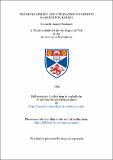The development and utilization of genetic markers for barley
Abstract
The development of new and novel polymorphic assay methods represents one of the most significant developments in plant and animal biology. The exploitation of these genetic markers is of relevance to both applied and fundamental research. Recombinant DNA technology provides the opportunity to develop phenotypically neutral genetic markers in any organism from which DNA can be extracted. The research described in this thesis has focused on the development, evaluation and exploitation of genetic markers in barley. Both protein and DNA based molecular markers were evaluated as a means of detecting polymorphism in H. vulgare and H. spontaneum. New methods for detecting polymorphisms based on the Polymerase Chain Reaction (PCR) were assessed and successfully applied to barley. The segregation of alleles at morphological, isozyme and RFLP loci were monitored in doubled haploid (DH) populations of barley. In order to detect molecular variability, both clones of known function and anonymous clones were employed. Clones homologous to the- hordein gene complex on chromosome IH were used in conjunction with DHs to intra-chromosomally map various members of this multi-gene family. Allelic variation at the genetic loci segregating in the DH population was evaluated in relation to the expression of quantitative traits. This study established that several isozymes and RFLP loci were significantly associated with quantitative trait loci (QTL) of agronomic importance. Grain isozyme and ribosomal DNA (rDNA) variability was examined in Hordeum spontaneum populations sampled from 27 geographical sites in Israel. Considerable phenotypic variability was observed and isozyme and rDNA variants were identified that were not present in the H. vulgare gene pool. Furthermore, the variability detected was quantified and correlated with a range of ecogeographical factors. The distribution of grain isozyme and rDNA phenotypes was non-random with particular phenotypes being restricted to specific geographical areas of Israel. Information on the spatial distribution of diversity in H. spontaneum is a pre-requisite for the optimization of sampling and germplasm collecting strategies. Opportunities and limitations to the exploitation of genetic markers in barley improvement are considered.
Type
Thesis, PhD Doctor of Philosophy
Collections
Items in the St Andrews Research Repository are protected by copyright, with all rights reserved, unless otherwise indicated.

